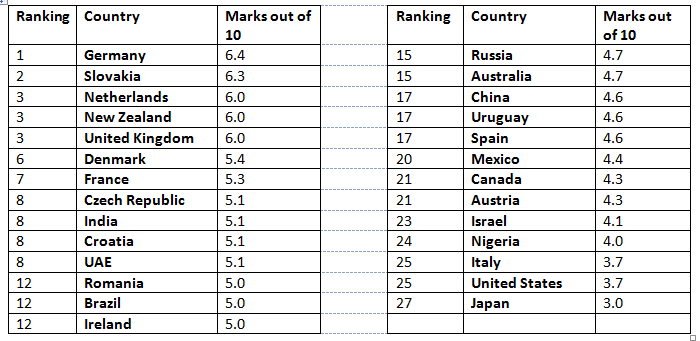Would-be Chinese and American multinationals held back by tax policy.
UHY taxation and business advisory professionals in 27 countries rated their economies on several factors including taxation and trade policy, that indicate how internationalised an economy already is and how well positioned it is to take advantage of future globalisation of trade.
The USA and Japan are falling behind Europe and China in the race to capitalise on globalisation and could miss out on future economic growth as a result, according to a new study by UHY, the international accounting and consultancy network.
UHY taxation and business advisory professionals in 27 countries rated their economies on several factors including taxation and trade policy, that indicate how internationalised an economy already is and how well positioned it is to take advantage of future globalisation of trade.
The factors examined in UHY’s study included; how successful a country has been in negotiating favourable tax arrangements with potential trading partners, how successful it has been in growing exports, how important a part trade already plays in its economy, how much tax it imposes on companies ‘repatriating’ overseas profits, how it is rated in the World Bank’s ‘Ease of Doing Business’ survey, and labour costs.
Assessed on these factors, the USA and Japan with scores of 3.7 and 3.0 respectively were surprisingly far behind both China, with its score of 4.6, and the EU member states, with an average score of 5.2 out of a maximum of 10.
While the USA and Japan both did well on their ‘Ease of Doing Business’ rating, their economies still remain more aligned to domestic activity than many of their competitors. UHY explains that this means companies in these countries are not fully exposed to international competition, which may make them less effective internationally. Additionally, both countries also had low scores for the factors measuring their success in negotiating favourable tax treatment by trading partners.
Germany topped the ratings with a score of 6.4 out of ten, while Slovakia was not far behind on 6.3 points. China was the best performing of the world’s top 3 economies with a score of 4.6, and India was the best-performing BRIC with a score of 5.1, helped by its low labour costs with an average monthly salary less than half as high as China’s.
Ladislav Hornan, chairman of UHY commented: “While both Japan and the USA still have huge domestic economies to help generate growth, making a more concerted effort to open themselves up to global trade and global competition could pay dividends in the future. Japan in particular is very conscious of the need to revive its economy after the lost decade has drifted into two decades.”
“Japan was once seen as having an unassailable lead in consumer electronics and a level of high-tech expertise that outweighed relatively high labour costs. No longer: Korean and Taiwanese giants like Samsung, LG and Foxconn now dominate that industry.”
Rick David of UHY LLP, member of UHY in the USA, stated: “In the past Canada, Mexico, Japan and the EU have been some of our most important and most co-operative trading partners, but it is perhaps time for policy makers to look at how we can improve relationships with emerging economies in Africa and Southern and South East Asia that are going to become bigger consumers and bigger importers as their incomes grow.”
Akira Wakatsuki of UHY Tokyo & Co and member of UHY in Japan, comments “So far, one of the centre pieces of recent Japanese economic policy – the devaluation of the Yen – has only had a limited impact on exports. It may be that domestic structural reforms and Japan’s intention to open up more to free trade through its participation in talks on the Trans-Pacific Partnership (TPP) are ultimately more successful in helping the economy to compete more successfully with cheaper, rival Asian economies.”
Within Europe, UHY point out that Slovakia, the Czech Republic and Romania have been very effective in taking advantage of the opportunities presented by the single market. Meanwhile, Spain, pulled out of recession in the third quarter of 2013 thanks to export growth, and could potentially see its trade position improve in the future. Georg Stöger of AUDITOR, UHY member firm in the Czech Republic and Slovakia said: “Slovakia in particular has been very effective in making the most of its EU membership and still relatively low labour costs. Its government has pursued a liberalisation agenda, and thanks to its traditional strengths in manufacturing, it’s becoming an increasingly important location for international businesses.”
“Currently countries like the Czech Republic, Romania and Slovakia all benefit from fairly low labour costs. As they continue to build up their skills base, improve infrastructure and reduce local bureaucracy they could become formidable competitors, especially if they are able to make the transition from trading within the EU to trading globally.”
Would-be Chinese and American multinationals held back by tax policy
While China did far better overall than the USA, with an overall score of 4.6 out of 10, both of the world’s two largest economies’ scores – were also brought down by the high taxes their governments impose on corporates ‘repatriating’ overseas profits.
UHY says that these taxes reduce the incentive for businesses to set up subsidiaries overseas, particularly for SMEs for whom the costs of setting up international operations would be proportionately more expensive. Just under half of the countries in the study imposed no tax on repatriated dividends at all.
Rick David added: “American firms are household names around the world but actually our taxation system is very poorly geared towards encouraging US companies from growing overseas, with the highest tax on ‘repatriated’ profits of any country in the study.”
Rankings showing 27 countries’ ability to take advantage of future globalisation of trade
Notes:
Countries’ overall scores are based on their rankings for the detailed measures included in the study.
Data drawn from: the World Bank, World Trade Organisation, International Labour Organisation and national governments.




